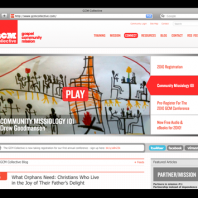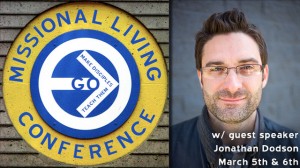Although Phillip Jenkins’ landmark book, The Next Christendom, popularized the observation that the center of Global Christianity has shifted away from the West to the two-thirds world, he was not the first to make this observation. The re-centering of Christianity is a phenomenon that has been noted by missiologists and historians alike.
Advance & Retreat of the Church
Church historian, Kenneth Latourette (1884-1963), noted these “pulsations in the life of Christianity.” Lautorette pointed out that the history of the church is a history of advance and retreat, advance and retreat. This oscillating influence over the centuries has not has resulted in various, new expressions of the Christian faith over time and across cultures. It is quite exciting to read about these current expressions of the gospel in Africa and Asia.
The Incomplete Glory of God
These new expressions of Christian faith in the advance of the church are, however, more than exciting. They are, in fact, an expansion of God’s glory. In The History of Redemption, Jonathan Edwards argues that God’s glory is incomplete. Edwards writes:
God looks on the communication of himself, and the emanation of the infinite glory and good that are in himself to belong to the fullness and completeness of himself, as though he were not in his most complete and glorious state without it. Thus the church of Christ is called the fullness of Christ: as though he were not in his complete state without her…
God is in an incomplete state. His glory is not full. Sounds awfully unorthodox. What is Edwards saying?
Missional Church is Not Enough
If Edwards is correct, the full expression of God’s glory can only be completed through the history of redemption, and the history of redemption can not be completed until “the end has come,” and the end will not come until “the gospel of the kingdom has been preached throughout the whole world as a testimony to all nations” (Matt 24:14). God’s glory, then, is advanced by expressions of the gospel in the changing cultures and geographies of the globe. The church must advance. His glory hangs on it.
However, the church also retreats. Our passion for mission wanes. Even with the resurgence of missional ecclesiology all of us who fail to share and show the gospel in our own cultures. Add to that the fact that 80% of deployed missionaries are sent to already evangelized areas. Roughly 30% of the global population is unevangelized and largely untargeted by so-called missional churches. This amounts to about 1.6 billion people not hearing the gospel in 38 different nations. There are still at least 13,000 unreached people groups and millions of people who have not heard a first proclamation of the gospel.
Apparently, Missional Church is not enough. When the focus of the Church is mission, we are destined to retreat, tire out, and fail. New eccesiology defined by mission is destined retreat as much, if not more, than it is to fail. What then are we to do? Throw up our arms in surrender and blend fully into our cultures with the hope of missional memory loss?
Completing the Glory of God
We need a greater, more captivating motivation than mission. When the motivation for mission is mission we are destined to fail. However, if our missional endeavors are motivated by something more reliable, more certain than our oscillating passion for the advance of the gospel, then there is hope.
If the history of redemption will not come to a close until God’s glory has been completed, then the assurance of mission starts and ends, not with the church but with God’s commitment to his own glorious expansion. It follows that to be increasingly motivated for mission is to be increasingly captivated by the God of expanding glory and beauty. Missional church is not enough. What we need is captivation with God’s glory, and a God who is relentless in showing his glory to his people throughout history. This glory is complete. It is his unchanging, ontological glory, and glory that is ontically expanded through history for our enjoyment.
We need awe in his ontological glory in order to advance his ontic glory. We need to linger on God more than mission. We need to return to the Bible. We need to throw ourselves to him in prayerful confession, repentance, and faith. We need the very same gospel we seek to advance, and we need it more than we know. We need the gospel to carry us into the depths of God’s character, beauty, and excellence where our imagination will be captivated and our affections thrilled. From this place of awe the mission of the church will advance and God’s glory will be complete.
 In a recent discussion on the GCM Collective Community site, we’ve been discussing ways to foster effective urban ministry. There have been some great best practices and insights shared. Here are three layers of mission I shared for missional communities (with examples from Austin City Life City Groups):
In a recent discussion on the GCM Collective Community site, we’ve been discussing ways to foster effective urban ministry. There have been some great best practices and insights shared. Here are three layers of mission I shared for missional communities (with examples from Austin City Life City Groups):

